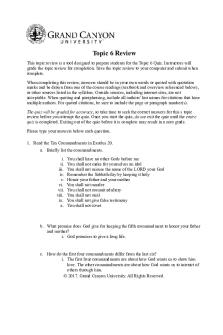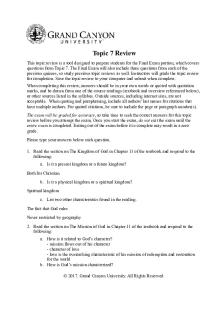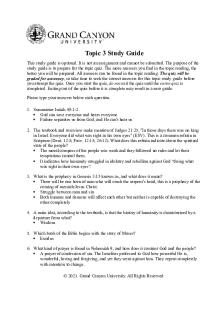CWV 301 RS T6Review Online PDF

| Title | CWV 301 RS T6Review Online |
|---|---|
| Course | Christian World View |
| Institution | Grand Canyon University |
| Pages | 4 |
| File Size | 162.8 KB |
| File Type | |
| Total Downloads | 57 |
| Total Views | 146 |
Summary
Download CWV 301 RS T6Review Online PDF
Description
Topic 6 Review This topic review is a tool designed to prepare students for the Topic 6 Quiz. Instructors will grade the topic review for completion. Save the topic review to your computer and submit when complete. When completing this review, answers should be in your own words or quoted with quotation marks and be drawn from one of the course readings (textbook and overview referenced below), or other sources listed in the syllabus. Outside sources, including internet sites, are not acceptable. When quoting and paraphrasing, include all authors' last names for citations that have multiple authors. For quoted citations, be sure to include the page or paragraph number(s). The quiz will be graded for accuracy, so take time to seek the correct answers for this s topic review before you attempt the quiz. Once you start the quiz, do not exit the quiz until the entire quiz is completed. Exiting out of the quiz before it is complete may result in a zero grade. Please type your answers below each question. 1. Read the Ten Commandments in Exodus 20. a. Briefly list the commandments. i. ii. iii. iv. v. vi. vii. viii. ix. x.
You shall have no other Gods before me You shall not make for yourselves an idol You shall not misuse the name of the LORD your God Remember the Sabbath day by keeping it holy Honor your father and your mother You shall not murder You shall not commit adultery You shall not steal You shall not give false testimony You shall not covet
b. What promise does God give for keeping the fifth commandment to honor your father and mother? i. God promises to give a long life.
c. How do the first four commandments differ from the last six? i. The first four commandments are about how God wants us to show him love. The other commandments are about how God wants us to interact of others through him. © 2017. Grand Canyon University. All Rights Reserved.
2. Read the Beatitudes, the blessings of Jesus in the opening verses of the Sermon on the Mount, in Matthew 5:1-12. Which one is repeated and emphasized? a. The one that is repeated and emphasized is “Blessed are the persecuted. Because, the Lord says those that are will be rewarded greatly in heaven”.
3. From the overview, what two commandments did Jesus say are the greatest? a. The two commandments Jesus say that are the greatest are “You shall love the Lord your God with all your heart and with all your soul and with all your mind and with all your strength,” and “You shall love your neighbor as yourself”.
4. From the overview and textbook, write the short quote that philosopher Friedrich Nietzsche made famous about truth. a. A short quote that philosopher Friedrich Nietzsche made famous about truth would be “There is not truth, only interpretations.”
5. From the textbook, describe how Raphael, in his great painting School of Athens, depicted Plato and Aristotle. a. Raphael depicted Plato in his great painting School of Athens as that some people believe that the truth is justified in common principles established by God. Those principles manage reality which leads to right and wrong. Raphael depicted Aristotle as that some of the truth is understood through sensory experience of examples that are found in the world which leads to a more common sense-based view of right and wrong. This focuses on conditions and circumstances rather than principles.
6. According to the textbook, most views of truth recognize that truth is discerned by what three means? a. Most views of truth recognized by truth is experience, empirical data and reasoning.
7. According to the textbook, what is the nihilistic view of knowledge? a. Nihilistic view of knowledge is eliminating the likelihood of anything of substance beneath or beyond individual understanding.
8. Briefly define general and special revelation. 2
a. General revelation refers that God reveals himself through what he was created by and throughout the history, the natural laws that are commonly observed through scientific analysis. Special revelation is when God reveals himself to the individuals themselves. Then after they are taught, they teach what he was shown them to provide to others.
9. According to the textbook, how would you describe a pantheist’s understanding of truth? a. Pantheist’s understanding to truth is when the whole show is god and the universe contains god itself.
10. Describe the difference between universal morality and moral relativism. a. The differences between universal morality and moral relativism is that universal morality is true rules that apply to all people no matter time and place. Where moral relativism is that right or wrong situations are dependent on the people, time, place, culture and other factors.
11. From Chapter 8 of the textbook, define exclusivism and pluralism. a. Exclusive is the only way to God, where pluralism is there are many ways to God.
12. Express what Jesus is saying in John 14:6 in your own words. a. In John 14:6 it basically is saying that God is the only way. He is the truth.
13. According to the overview, what kind of absolute truths require the existence of God? a. The kind of absolute truths require the existence of God is moral and spiritual.
3
References Grand Canyon University. (2017). Topic 6 Overview [PDF document]. Phoenix, AZ: Grand Canyon University. Jibben, J. (2015). The wisdom of absolutes. In Grand Canyon University (Ed.), The beginning of wisdom: An introduction to Christian thought and life (2nd ed.). Available from http://gcumedia.com/digital-resources/grand-canyon-university/2015/the-beginning-ofwisdom_an-introduction-to-christian-thought-and-life_ebook_2e.php Lamca, C. (2015). Intellectual obstacles to wisdom. In Grand Canyon University (Ed.), The beginning of wisdom: An introduction to Christian thought and life (2nd ed.). Available from http://gcumedia.com/digital-resources/grand-canyon-university/2015/the-beginningof-wisdom_an-introduction-to-christian-thought-and-life_ebook_2e.php
© 2017. Grand Canyon University. All Rights Reserved....
Similar Free PDFs

CWV 301 RS T6Review Online
- 4 Pages

CWV 101 RS T6Review Online
- 4 Pages

CWV 101 RS T6Review Online
- 4 Pages

CWV 101 301 RS T2Origins
- 4 Pages

CWV 101 RS T7Review Online
- 3 Pages

CWV 101 RS T1Review Online
- 4 Pages

CWV 101 RS T3Review Online
- 4 Pages

CWV 101 RS T7Review Online
- 4 Pages

CWV-101-RS-T2Review-Online
- 4 Pages

CWV 101 RS T2Review Online
- 4 Pages

CWV 101 RS T1Review Online
- 4 Pages
Popular Institutions
- Tinajero National High School - Annex
- Politeknik Caltex Riau
- Yokohama City University
- SGT University
- University of Al-Qadisiyah
- Divine Word College of Vigan
- Techniek College Rotterdam
- Universidade de Santiago
- Universiti Teknologi MARA Cawangan Johor Kampus Pasir Gudang
- Poltekkes Kemenkes Yogyakarta
- Baguio City National High School
- Colegio san marcos
- preparatoria uno
- Centro de Bachillerato Tecnológico Industrial y de Servicios No. 107
- Dalian Maritime University
- Quang Trung Secondary School
- Colegio Tecnológico en Informática
- Corporación Regional de Educación Superior
- Grupo CEDVA
- Dar Al Uloom University
- Centro de Estudios Preuniversitarios de la Universidad Nacional de Ingeniería
- 上智大学
- Aakash International School, Nuna Majara
- San Felipe Neri Catholic School
- Kang Chiao International School - New Taipei City
- Misamis Occidental National High School
- Institución Educativa Escuela Normal Juan Ladrilleros
- Kolehiyo ng Pantukan
- Batanes State College
- Instituto Continental
- Sekolah Menengah Kejuruan Kesehatan Kaltara (Tarakan)
- Colegio de La Inmaculada Concepcion - Cebu




